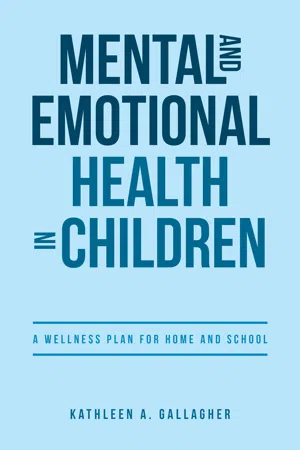
eBook - ePub
Mental and Emotional Health in Children
A Wellness Plan for Home and School
Kathleen A. Gallagher
This is a test
Condividi libro
- 72 pagine
- English
- ePUB (disponibile sull'app)
- Disponibile su iOS e Android
eBook - ePub
Mental and Emotional Health in Children
A Wellness Plan for Home and School
Kathleen A. Gallagher
Dettagli del libro
Anteprima del libro
Indice dei contenuti
Citazioni
Informazioni sul libro
Mental and Emotional Health in Children by Kathleen A. Gallagher
__________________________________
Domande frequenti
Come faccio ad annullare l'abbonamento?
È semplicissimo: basta accedere alla sezione Account nelle Impostazioni e cliccare su "Annulla abbonamento". Dopo la cancellazione, l'abbonamento rimarrà attivo per il periodo rimanente già pagato. Per maggiori informazioni, clicca qui
È possibile scaricare libri? Se sì, come?
Al momento è possibile scaricare tramite l'app tutti i nostri libri ePub mobile-friendly. Anche la maggior parte dei nostri PDF è scaricabile e stiamo lavorando per rendere disponibile quanto prima il download di tutti gli altri file. Per maggiori informazioni, clicca qui
Che differenza c'è tra i piani?
Entrambi i piani ti danno accesso illimitato alla libreria e a tutte le funzionalità di Perlego. Le uniche differenze sono il prezzo e il periodo di abbonamento: con il piano annuale risparmierai circa il 30% rispetto a 12 rate con quello mensile.
Cos'è Perlego?
Perlego è un servizio di abbonamento a testi accademici, che ti permette di accedere a un'intera libreria online a un prezzo inferiore rispetto a quello che pagheresti per acquistare un singolo libro al mese. Con oltre 1 milione di testi suddivisi in più di 1.000 categorie, troverai sicuramente ciò che fa per te! Per maggiori informazioni, clicca qui.
Perlego supporta la sintesi vocale?
Cerca l'icona Sintesi vocale nel prossimo libro che leggerai per verificare se è possibile riprodurre l'audio. Questo strumento permette di leggere il testo a voce alta, evidenziandolo man mano che la lettura procede. Puoi aumentare o diminuire la velocità della sintesi vocale, oppure sospendere la riproduzione. Per maggiori informazioni, clicca qui.
Mental and Emotional Health in Children è disponibile online in formato PDF/ePub?
Sì, puoi accedere a Mental and Emotional Health in Children di Kathleen A. Gallagher in formato PDF e/o ePub, così come ad altri libri molto apprezzati nelle sezioni relative a Didattica e Gestione comportamentale. Scopri oltre 1 milione di libri disponibili nel nostro catalogo.
Informazioni
Argomento
DidatticaCategoria
Gestione comportamentaleChapter 4
Discussions with Children on Handling Emotions
Purpose of Discussions
We teach skills for living by a process of simply listening to how others handle situations. We may think children should know better at certain times, but they do not unless they have been taught. Children act the way they have seen others act. And children act the way they feel unless they have learned other options.
When Discussions Are Used
In school, use a small-group time similar to a reading or math session with six to eight children sitting in a circle or around a table. At home, it can be a conversation at mealtime, while sitting in the den, playing a game, sitting with a child who is doing homework, or when getting ready for bed. It will work even with one child. In school, the discussion will take no more than ten minutes.
The Process
- Select a topic from the list provided below.
- Explain the procedure with such words as, “Today’s lesson is about the feeling of anger. Feelings are our friends. They tell us what we like and dislike, whom to choose as friends and whom to stay away from. I’ll mention one thing I do when I feel angry, and then each one of you can say something you do when you’re angry, or it’s okay to say, ‘I pass.’ Give each person your attention when it’s their turn because they deserve that respect. It’s okay for you to speak or not speak. No one has to talk. Let’s not laugh at what anyone says because you know how you would feel being laughed at.”
- In school, children from healthier homes will pass along healthy information. Children from less healthy homes will receive new information to broaden their perspectives.
- As you start off the discussion, share one of your own ideas or one of the suggestions offered below on that topic.
- Do not ask children to volunteer responses. Introverted or fearful children will not volunteer. When the group takes turns in order, more children usually take a turn.
- Do not use children’s names. After one child has spoken or passed, just say, “okay, next.”
- The teacher is the facilitator. Do not interact with any student no matter how wise or bizarre their comment may be.
- Let the group hear all the expressed options and form personal opinions about what has been revealed.
- At the end, the teacher (facilitator) does not prioritize the value of any comment given.
Topics for Discussion
The teacher takes the first turn and then says to the child beside her, “Okay, your turn.” Try not to start with the same child each time.
Dealing with anger: What can you do when you feel angry at someone?
- If you can, say to the person, “I feel angry when you say that or do that.”
- Walk away from the person or situation. Maybe the person is having a bad day.
- Tell a friend or an adult what you are angry about.
- Ride your bike or take a run.
- Stop and think before you do anything. You’ll feel bad if you hurt someone back.
- Tell yourself some things you are grateful for.
- Go and do something you like to do.
- It’s okay to feel angry. ...